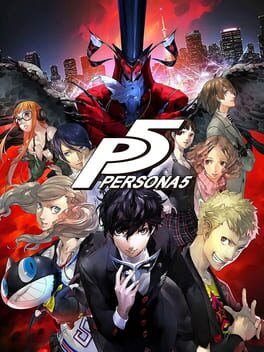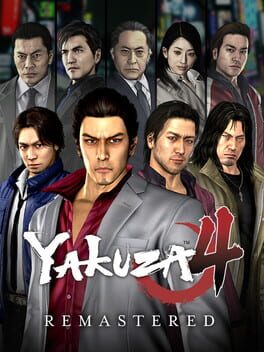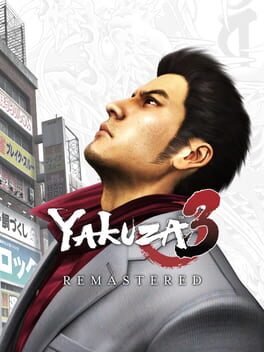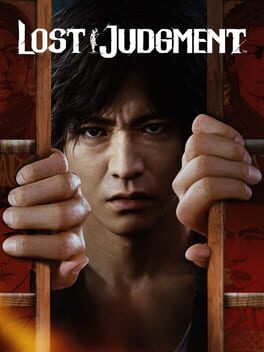PEN16Club
Bio
Nothing here!
Badges

GOTY '23
Participated in the 2023 Game of the Year Event

Noticed
Gained 3+ followers

Well Written
Gained 10+ likes on a single review

Liked
Gained 10+ total review likes

Gone Gold
Received 5+ likes on a review while featured on the front page

Gamer
Played 250+ games

3 Years of Service
Being part of the Backloggd community for 3 years

GOTY '21
Participated in the 2021 Game of the Year Event

N00b
Played 100+ games

GOTY '20
Participated in the 2020 Game of the Year Event
Favorite Games
276
Total Games Played
000
Played in 2024
000
Games Backloggd
Recently Played See More
Recently Reviewed See More
I appreciate the Yakuza series for a lot of reasons. One reason is that it knows exactly what it is and what it isn’t. RGG Studio has a tried and true method for creating great games at a regular pace with its limited resources. I know there are a few outliers that I’m not terribly familiar with (there’s zombies I guess?) but I think most fans would have been happy for years to come seeing the same middle-aged guys in ugly suits literally punch each other to death instead of going to therapy. In an atmosphere like that, and with market incentives the way they are, it takes more than a little courage to break out and make a significant departure from a winning formula.
It’s also a bit of a roadblock to objectivity. I wrote and deleted a whole thing about Judgment (the previous game, not the song). It started with the premise that “I don’t love this game, but not because it’s a little different from the main series”. Then I spent multiple pages explaining how I didn’t love the game because it’s a little different from the main series. It’s only natural to want to see your favorite artists play the hits, but that’s not exactly conducive to growth or creativity, either. After an unreasonable amount of reflection, I think I can say that Judgment was a solid first step that set the stage for Lost Judgment to knock it out of the park. It is completely worthy of this series in its own way, but still carries with it RGG’s passion for compelling characters, engaging side content, and hitting children.
It’s those characters and that side content that interest me the most. And all of these games depend heavily on their protagonists, so let’s start there. Judgment and Lost Judgment star Takayuki Yagami, the coolest guy to ever wear a wallet chain or use a bluetooth headset. I might have been a little personally invested in seeing Yagami succeed as a protagonist. As a former young professional-type in his mid-30s, somewhat obsessed with fast/fast casual dining, who washed out as an attorney in 2015 and now works as in investigator in a private capacity, something about him resonated with me. Who can say why. But it still didn’t click right away.
Yakuza isn’t shy about introducing new protagonists, but Yagami was a departure even by those standards. A detached, millennial-type really set these games apart from the Extremely Earnest boomers we’re used to. I guess it’s only natural that it took a whole game for him really get his sea legs as a character. He was trying to be the same kind of altruistic tough guy with a big heart, but I still don’t think it really came through in my experience with Judgment. He’s rarely helping people out of the kindness of his heart. Most of the people Yagami helped in sidequests were paying customers. And he never really left his comfort zone or had those fish-out-of-water moments that reveal a lot of character in other guys like Kiryu or Majima (you can probably see the trap I fell into trying to write about this. It doesn’t have to be done the same way, but it should probably be done well and I’m not sure it was done well). His friendship with his partner Kaito picked up a lot of the slack, and was the beating heart of that game. Also I appreciated that he was very “of Kamurocho”. It was made very clear that he lives right in the heart of the city and his connection to various businesses and townsfolk were a focal point of side and main stories. With a sequel, I half-expected them to take the easy way out of characterizing Yagami: join him directly to Kaito’s hip and expand on the local reputation/friendship systems. They did not do any of that.
The side content in Judgment was also very underwhelming. I realize in my head I’ve drawn a distinction in my head between “minor” and “major” side content, where minor content is any meaningless distraction with no extra story attached to it. Pool, darts, karaoke, you get it. Then major content is anything that the writers had to be involved in. Something with cutscenes, introducing actual named characters, etc. There’s nothing wrong with minor side content, but it feels pretty incomplete without the major stuff. It forces it into more spotlight than it can handle. And I honestly don’t remember any major side content in Judgment. Maybe I missed it, but that would only be because the game didn’t put its best foot forward. The VR game seemed to just be combat with unnecessary extra steps. I did it the mandatory single time. Drone racing seemed sort of fun, I did it a few times, but I couldn’t justify investing the time into it. I kept expecting some cocky villain drone racer to pop up in a cutscene and give me some motivation. I never saw one, at least. Other minor side content was mostly or entirely recycled. Again, it doesn’t have to be exactly like other Yakuza games, but why am I even bothering with this as is?
Leaving out karaoke was courageous, and something I interpreted as a statement on the separate identity and direction of this side series. I can respect that, but Yagami’s characterization failed even more as a result. That transition midway through a karaoke song, where the singer seems to be imagining themselves performing or acting out the music video for the song, is really meaningful. Seeing in a trailer for the next game that Kiryu is going to sing Judgement (the song, not the game) again, with a new bandmate, almost brought a tear to my eye. I wish I was kidding. Even to just learn what kind of music Yagami or Kaito like would have been an interesting development for the characters. I just looked up Takuya Kimura on Wikipedia to get an idea of his whole deal, and it seems like he’d have been up for it. I guess the composer that they keep in a dark basement somewhere, cranking out banger after banger, needs a break every once in a while. But still, its absence is felt.
They pulled a complete 180 on both of their biggest problems. The best parts about Lost Judgment are the characterization and the side content. The school stories contain all the major side content, mostly in one place. It leads to Yagami helping a bunch of different students, more or less out of the kindness of his heart. It forces him into all manner of situations unbecoming of a detective in a cool jacket such as himself. You start by helping out the school dance team. Yagami is there to advise and incorporate “kung fu” moves into their dances, but he immediately starts doing a bunch of air guitar like a doofus. It’s beautiful. There are optional hilarious costumes you can force him to wear. The team competes in regular competitions against other schools. Like in Glee. This game is basically just Glee, now that I think about it. But when they win one of those competitions, Yagami is in the front row, beaming like a proud father. That’s finally when the character clicked for me. Each story has its own arc, with its own conclusion and characters. Some are better than others, certainly. Boxing and robot fighting are standouts. Skateboarding did not make a good first impression.
I barely messed with sidequests/side cases, but they looked like a big time improvement. The few I played around with were significantly more weird than the ones in the first game. They still featured the most detective-y stuff in the game, like tailing and observation mode. I’ll gloss over those because if I started writing about everything not to like about the tailing minigame, I’m afraid I’d never stop.
Actually, I have to get into it a little. If your main character is a detective, either go all in with the detective mechanics, or don’t. These games try a half-measure that never works, and it’s collectively the worst aspect of the two games. The games force me into first-person and my eyes just glaze over. Fun time is now officially over. Lost Judgment completely replaced first-person mode with this observation mode, so you can’t even really take in these environments in the best way anymore, unless you want to walk around like a 90-year-old with a cluttered UI. Definitely don’t expect to solve the mysteries before the characters do, either, even though you’d expect that to be the point. Then it fails in the other direction, too. Presenting your evidence through a multiple choice test with unlimited guesses just completely defeats the purpose. The game would be no worse off if Yagami was a detective that did all of his detective business outside of the player’s control. That feeling of coming across a new lead and hitting the streets to learn more is still exhilarating, and that’s really all we needed.
Minor side content had a few winners that don’t pop up very often. I think golf is pretty fun. I understand they brought back the VR and drone racing stuff again. I’m sure they’re just fine. And ever since I was very young I wondered what Sonic: The Fighters was like. It’s god awful, but now I don’t have to wonder anymore. Thanks, Sega!
There’s more to a game than good vibes. Or so I’ve been told. Combat has improved a fair amount with the addition of a super-fun third style. A style based around disarming and then showing mercy to enemies, sometimes mockingly, was another great advancement for Yagami’s character. I always wondered why they dropped the “heat gauge” and “heat action” names without actually changing the mechanic in any meaningful way. This made it obvious, though. Kiryu runs on emotion in his most meaningful fights, so he’s building up anger, emotion, whatever you want to call it. Yagami doesn’t, so much. He’s building up… I’m not sure what, exactly, but it was a smart change all the same.
The presentation was a positive. With an all-star cast of voices you vaguely remember from Persona games, featuring Steve Blum doing "The Voice". The first game buried an It’s Always Sunny in Philadelphia reference in the English translation. Then a skateboarding cutscene in this game threw in a real subtle 30 Rock reference. One of those per game is pretty cute. The game has the best lip sync I've ever seen in a game. That is, when they feel like doing it. I shouldn't complain, the fact that they did any English lip sync at all was a huge bonus. Graphics and chyrons no longer use that endearingly stupid Yakuza font, and now wouldn’t look out of place on the window of a law firm, which makes an immediate impression. And video games should have cold opens followed by anime opening sequences.
The story might have been a slight step down from Judgment, though that was easily Judgment’s strong suit. And as a washed up lawyer, I appreciated that the law stuff wasn’t just window dressing that they made up as they went along. I’ll admit that I’m not an expert in Japanese law, or any law, really. But I happened to look up during the credits and saw that they had a law firm consulting on the writing. Phoenix Wright is its own thing, and seems to be doing just fine, but they’re super not for me and it was a little funny that the games appeared to be trying to start some light beef with Capcom. Judgment was essentially obligated to do a Phoenix Wright parody, so they did. Then late-ish in Lost Judgment, Yagami really goes out of his way to shut down a prosecutor trying to shift the burden of proof onto the defense, which I interpreted as a pointed reference. That might not be justified or reasonable, but I just kinda yelled “Thank you!” at the screen. It was also shocking to learn that attorney badges, the most video gamey thing I’ve ever seen in my life, are actually real.
And boy oh boy, do you beat up a lot of children. It’s probably for the best that this series stays little niche.
Everyone has their biases, and it’s best to have them out there in the open. As much as I tried to get away from them, I have to admit that this game’s departures from the main series painted it in a more negative light for me than if I had, say, started with these two games. But the fact that the game was as enjoyable as it was is a real testament to its quality.
It’s also a bit of a roadblock to objectivity. I wrote and deleted a whole thing about Judgment (the previous game, not the song). It started with the premise that “I don’t love this game, but not because it’s a little different from the main series”. Then I spent multiple pages explaining how I didn’t love the game because it’s a little different from the main series. It’s only natural to want to see your favorite artists play the hits, but that’s not exactly conducive to growth or creativity, either. After an unreasonable amount of reflection, I think I can say that Judgment was a solid first step that set the stage for Lost Judgment to knock it out of the park. It is completely worthy of this series in its own way, but still carries with it RGG’s passion for compelling characters, engaging side content, and hitting children.
It’s those characters and that side content that interest me the most. And all of these games depend heavily on their protagonists, so let’s start there. Judgment and Lost Judgment star Takayuki Yagami, the coolest guy to ever wear a wallet chain or use a bluetooth headset. I might have been a little personally invested in seeing Yagami succeed as a protagonist. As a former young professional-type in his mid-30s, somewhat obsessed with fast/fast casual dining, who washed out as an attorney in 2015 and now works as in investigator in a private capacity, something about him resonated with me. Who can say why. But it still didn’t click right away.
Yakuza isn’t shy about introducing new protagonists, but Yagami was a departure even by those standards. A detached, millennial-type really set these games apart from the Extremely Earnest boomers we’re used to. I guess it’s only natural that it took a whole game for him really get his sea legs as a character. He was trying to be the same kind of altruistic tough guy with a big heart, but I still don’t think it really came through in my experience with Judgment. He’s rarely helping people out of the kindness of his heart. Most of the people Yagami helped in sidequests were paying customers. And he never really left his comfort zone or had those fish-out-of-water moments that reveal a lot of character in other guys like Kiryu or Majima (you can probably see the trap I fell into trying to write about this. It doesn’t have to be done the same way, but it should probably be done well and I’m not sure it was done well). His friendship with his partner Kaito picked up a lot of the slack, and was the beating heart of that game. Also I appreciated that he was very “of Kamurocho”. It was made very clear that he lives right in the heart of the city and his connection to various businesses and townsfolk were a focal point of side and main stories. With a sequel, I half-expected them to take the easy way out of characterizing Yagami: join him directly to Kaito’s hip and expand on the local reputation/friendship systems. They did not do any of that.
The side content in Judgment was also very underwhelming. I realize in my head I’ve drawn a distinction in my head between “minor” and “major” side content, where minor content is any meaningless distraction with no extra story attached to it. Pool, darts, karaoke, you get it. Then major content is anything that the writers had to be involved in. Something with cutscenes, introducing actual named characters, etc. There’s nothing wrong with minor side content, but it feels pretty incomplete without the major stuff. It forces it into more spotlight than it can handle. And I honestly don’t remember any major side content in Judgment. Maybe I missed it, but that would only be because the game didn’t put its best foot forward. The VR game seemed to just be combat with unnecessary extra steps. I did it the mandatory single time. Drone racing seemed sort of fun, I did it a few times, but I couldn’t justify investing the time into it. I kept expecting some cocky villain drone racer to pop up in a cutscene and give me some motivation. I never saw one, at least. Other minor side content was mostly or entirely recycled. Again, it doesn’t have to be exactly like other Yakuza games, but why am I even bothering with this as is?
Leaving out karaoke was courageous, and something I interpreted as a statement on the separate identity and direction of this side series. I can respect that, but Yagami’s characterization failed even more as a result. That transition midway through a karaoke song, where the singer seems to be imagining themselves performing or acting out the music video for the song, is really meaningful. Seeing in a trailer for the next game that Kiryu is going to sing Judgement (the song, not the game) again, with a new bandmate, almost brought a tear to my eye. I wish I was kidding. Even to just learn what kind of music Yagami or Kaito like would have been an interesting development for the characters. I just looked up Takuya Kimura on Wikipedia to get an idea of his whole deal, and it seems like he’d have been up for it. I guess the composer that they keep in a dark basement somewhere, cranking out banger after banger, needs a break every once in a while. But still, its absence is felt.
They pulled a complete 180 on both of their biggest problems. The best parts about Lost Judgment are the characterization and the side content. The school stories contain all the major side content, mostly in one place. It leads to Yagami helping a bunch of different students, more or less out of the kindness of his heart. It forces him into all manner of situations unbecoming of a detective in a cool jacket such as himself. You start by helping out the school dance team. Yagami is there to advise and incorporate “kung fu” moves into their dances, but he immediately starts doing a bunch of air guitar like a doofus. It’s beautiful. There are optional hilarious costumes you can force him to wear. The team competes in regular competitions against other schools. Like in Glee. This game is basically just Glee, now that I think about it. But when they win one of those competitions, Yagami is in the front row, beaming like a proud father. That’s finally when the character clicked for me. Each story has its own arc, with its own conclusion and characters. Some are better than others, certainly. Boxing and robot fighting are standouts. Skateboarding did not make a good first impression.
I barely messed with sidequests/side cases, but they looked like a big time improvement. The few I played around with were significantly more weird than the ones in the first game. They still featured the most detective-y stuff in the game, like tailing and observation mode. I’ll gloss over those because if I started writing about everything not to like about the tailing minigame, I’m afraid I’d never stop.
Actually, I have to get into it a little. If your main character is a detective, either go all in with the detective mechanics, or don’t. These games try a half-measure that never works, and it’s collectively the worst aspect of the two games. The games force me into first-person and my eyes just glaze over. Fun time is now officially over. Lost Judgment completely replaced first-person mode with this observation mode, so you can’t even really take in these environments in the best way anymore, unless you want to walk around like a 90-year-old with a cluttered UI. Definitely don’t expect to solve the mysteries before the characters do, either, even though you’d expect that to be the point. Then it fails in the other direction, too. Presenting your evidence through a multiple choice test with unlimited guesses just completely defeats the purpose. The game would be no worse off if Yagami was a detective that did all of his detective business outside of the player’s control. That feeling of coming across a new lead and hitting the streets to learn more is still exhilarating, and that’s really all we needed.
Minor side content had a few winners that don’t pop up very often. I think golf is pretty fun. I understand they brought back the VR and drone racing stuff again. I’m sure they’re just fine. And ever since I was very young I wondered what Sonic: The Fighters was like. It’s god awful, but now I don’t have to wonder anymore. Thanks, Sega!
There’s more to a game than good vibes. Or so I’ve been told. Combat has improved a fair amount with the addition of a super-fun third style. A style based around disarming and then showing mercy to enemies, sometimes mockingly, was another great advancement for Yagami’s character. I always wondered why they dropped the “heat gauge” and “heat action” names without actually changing the mechanic in any meaningful way. This made it obvious, though. Kiryu runs on emotion in his most meaningful fights, so he’s building up anger, emotion, whatever you want to call it. Yagami doesn’t, so much. He’s building up… I’m not sure what, exactly, but it was a smart change all the same.
The presentation was a positive. With an all-star cast of voices you vaguely remember from Persona games, featuring Steve Blum doing "The Voice". The first game buried an It’s Always Sunny in Philadelphia reference in the English translation. Then a skateboarding cutscene in this game threw in a real subtle 30 Rock reference. One of those per game is pretty cute. The game has the best lip sync I've ever seen in a game. That is, when they feel like doing it. I shouldn't complain, the fact that they did any English lip sync at all was a huge bonus. Graphics and chyrons no longer use that endearingly stupid Yakuza font, and now wouldn’t look out of place on the window of a law firm, which makes an immediate impression. And video games should have cold opens followed by anime opening sequences.
The story might have been a slight step down from Judgment, though that was easily Judgment’s strong suit. And as a washed up lawyer, I appreciated that the law stuff wasn’t just window dressing that they made up as they went along. I’ll admit that I’m not an expert in Japanese law, or any law, really. But I happened to look up during the credits and saw that they had a law firm consulting on the writing. Phoenix Wright is its own thing, and seems to be doing just fine, but they’re super not for me and it was a little funny that the games appeared to be trying to start some light beef with Capcom. Judgment was essentially obligated to do a Phoenix Wright parody, so they did. Then late-ish in Lost Judgment, Yagami really goes out of his way to shut down a prosecutor trying to shift the burden of proof onto the defense, which I interpreted as a pointed reference. That might not be justified or reasonable, but I just kinda yelled “Thank you!” at the screen. It was also shocking to learn that attorney badges, the most video gamey thing I’ve ever seen in my life, are actually real.
And boy oh boy, do you beat up a lot of children. It’s probably for the best that this series stays little niche.
Everyone has their biases, and it’s best to have them out there in the open. As much as I tried to get away from them, I have to admit that this game’s departures from the main series painted it in a more negative light for me than if I had, say, started with these two games. But the fact that the game was as enjoyable as it was is a real testament to its quality.







